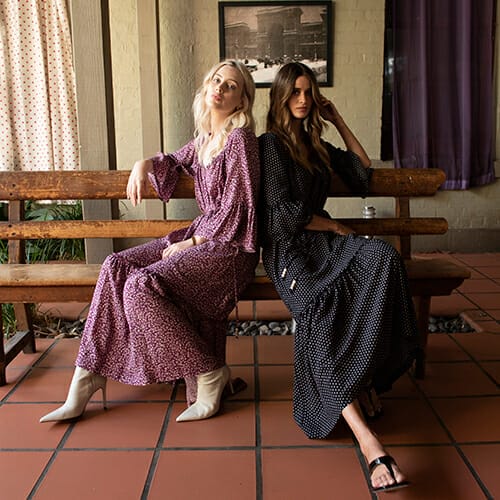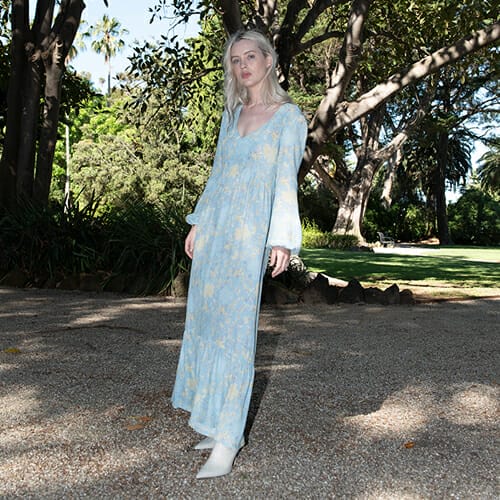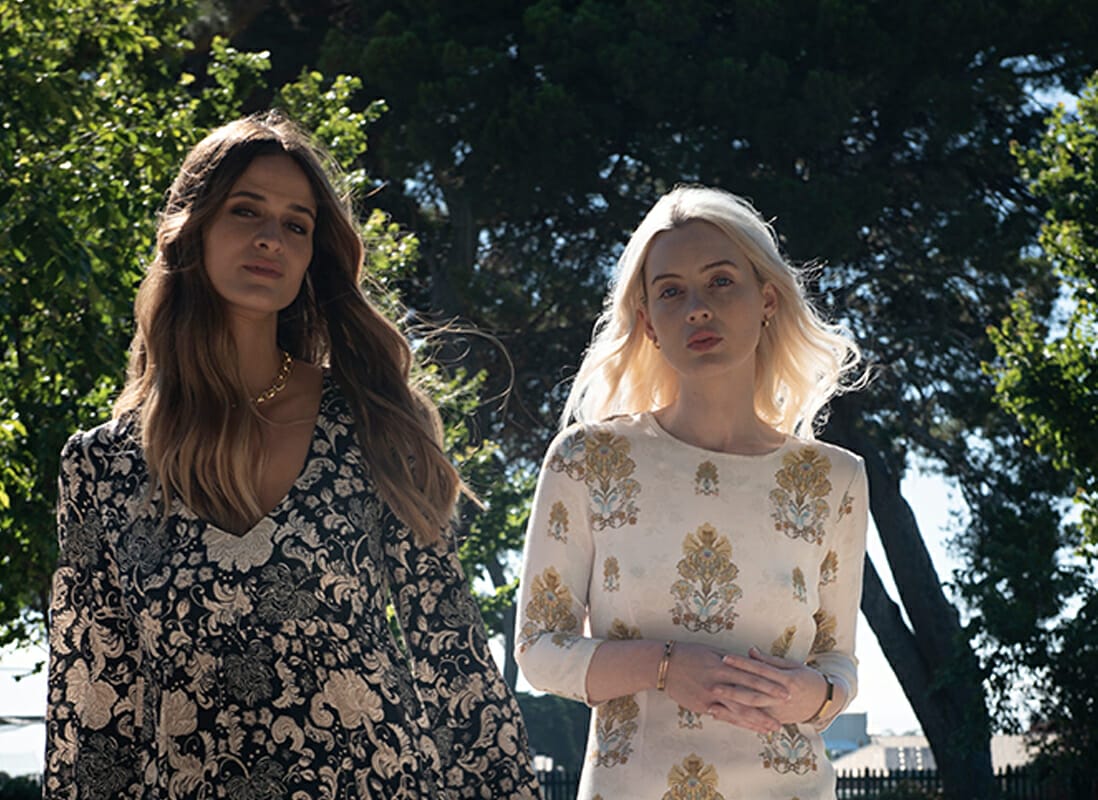Dreamy dresses designed & made in Melbourne.
Ethically made. Locally made. Minimal waste. Sustainable. Transparent.
Tunik offers a dreamy, curated edit of dresses in unique prints.
Tunik is located and manufactured in Melbourne. Tunik is currently sold exclusively online.
Who makes your clothes?
CGT Manufacturing in Brunswick, Victoria.
Can you share a little more about your values?
Ethically & Locally Made: I work with a local Melbourne manufacturer who is accredited with ethical manufacturing practices including workers conditions and pay. As everything is in Melbourne I can see with my own eyes how this company runs. For me this is important as it’s really the only way you can know the company you are working with.
Minimal Waste: I’m committed to only ordering the fabric that I need and utilising all of it. I have plans to do various things with fabric leftovers including selling it on to stores who stock remnant fabrics and also donating to schools and their textiles departments. This is something I used to do in industry a lot when working for larger companies and the students appreciate the help!
Sustainable: In terms of sustainability and ethical choices we choose to partner with companies like Sendle and DHL. These companies have programs that have carbon neutral off set schemes which means each time we use their service we at Tunik pay a donation. That donation is then deposited back into the environment by supporting the planting of trees for example (there are many many climate protection projects run by these two companies and they can be found on their websites and they change and reinvest monthly where it is needed most). We are also sending our orders out in recycled packaging (our tissue paper and postcards are printed with Noissue) and we use compostable mailers. We will never use plastic bags for our product and we recycle boxes for our stock, especially at factory and warehouse level. It takes more care but there is nothing more heartbreaking than to see each garment wrapped in a plastic bag that will end up in landfill or the ocean. It’s highly unnecessary and there is no reason a company can justify using them anymore!
Transparent: I am willing to share where I am manufacturing and ordering from. It’s important to help the customer feel like they can trust you and where they are spending their money.
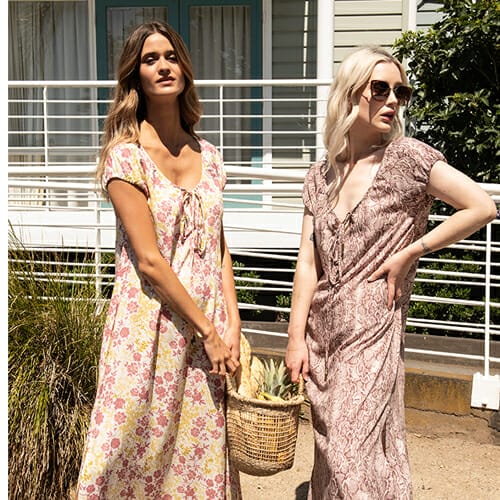
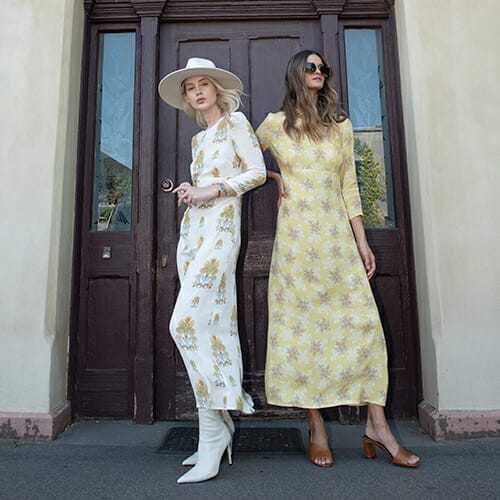
Which particular fabrics do you use?
Choosing fabric is tricky as there really is no perfect ethical choice. I chose to find a way to reduce the processes that I use in the finished fabric. I chose to work with a factory to source raw fabrics – Silk Elastane Rayon Voile Rayon Viscose – and then I skip the dye process which is very damaging to both the environment and workers. Instead I have the fabrics digitally printed with my designs. This gives the fabrics a point of difference and added colour without going through a dye process that creates toxins, pollutants and water wastage on a much larger scale than digital print. I chose natural fibres (silk) and very close to natural fibres (Rayon and Rayon Viscose blend) as they have less of an impact on the environment through their manufacturing – especially when they are not dyed.
Fabrics are necessary and some form of processing is a necessary evil. What we need to do is to be smarter about reducing the processes that our fabrics go through. This way we can greatly reduce the impact. I’m not sure that it’s realistic to eradicate every damaging process in any industry that makes products but we can certainly reduce them and it will absolutely make a marked difference.
Any extra efforts you make at Tunik that you can share?
My Collection is clear and concise for a reason and it’s intentional. I offer dresses. This is my favourite shape. It’s a quick and easy decision for a woman to make when getting dressed. They are versatile and one dress can tick many boxes with a bit of styling. And this also happens to reduce our choices in what we wear. I cannot justify selling multiple category collections. Selling garments to women and add ons that they don’t need. Encouraging over spending and over consumption. I believe if one garment can do the job of three different garments i.e. a top, a pair of pants and a jacket…then we are reducing consumption right there. This is a theory I decided in my design process I would like to explore more and will continue to explore as a basis for Tunik existing in the sustainability space.
Can you share some labels you admire?
Outerknown are without a doubt my go to for an example of a business that is leading the way with ethics and sustainability. Their style and product is really nothing like mine, but their mindset is. I also feel Stella McCartney has done so much for the industry in terms of going vegan in the production of accessories and fur. She’s a nature and animal girl at heart so you know it comes from a really genuine caring place. Personally I love nature, animals and my daughter and all children. I want all three to have a future that is healthy and abundant.
Price guide: $200 – 300 up to $300 – 500
Size guide: Small, Medium, Large
Want to get in touch with Tunik:
tunik.com.au / @tunik_thelabel / TUNIK – Home | Facebook / [email protected]
